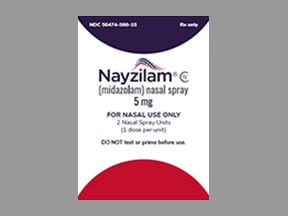
Nayzilam Coupons & Savings Card – Discount Prices from $667.83
My prescription
Edit
5MG/0.1ML, Nayzilam (2 Solutions)
Select pharmacy

CVS
$698.12
COUPON PRICE
Albertsons
$667.83
COUPON PRICE
Walmart
$681.28
COUPON PRICE
Walgreens
$683.01
COUPON PRICENayzilam savings card
Show this card to your pharmacist
Albertsons
$667.83
BIN
ID
PCN
GRP
015995
LHKPW634877
GDC
DR33
Powered by
Related benzodiazepines prescriptions
More prescriptions for epilepsy
Related benzodiazepines prescriptions
More prescriptions for epilepsy
Price history for Nayzilam
2 Solutions, 5MG/0.1ML
Average retail price for Nayzilam
Average SaveHealth price for Nayzilam
Our price history data is based on aggregated prescription data collected from participating pharmacies in America. Our prescription data updates daily to reflect the latest price changes. If you notice a missing data point, it means there wasn't sufficient data available to generate a monetary value for that date.
*Retail prices are based on pharmacy claims data, and may not be accurate when we don't have enough claims.
Nayzilam dosage forms
Dosage Quantity Price from Per unit 5MG/0.1ML 2 Solutions $670.28 $335.14 5MG/0.1ML 1 Solution $340.64 $340.64
| Dosage | Quantity | Price from | Per unit |
|---|---|---|---|
| 5MG/0.1ML | 2 Solutions | $670.28 | $335.14 |
| 5MG/0.1ML | 1 Solution | $340.64 | $340.64 |
What is the drug Nayzilam used for?
Nayzilam is used for the acute treatment of intermittent, stereotypic episodes of frequent seizure activity, also known as seizure clusters, in patients with epilepsy.
Is Nayzilam an opioid?
Nayzilam is not an opioid. It is a benzodiazepine used for the treatment of seizure clusters.
Is Nayzilam the same as diazepam?
Nayzilam and diazepam are not the same. Nayzilam is a brand name for midazolam, which is a medication used primarily for the treatment of acute seizures. Diazepam, on the other hand, is a different medication that is also used for anxiety, muscle spasms, and seizures, among other conditions. Both belong to the benzodiazepine class but have different active ingredients and specific uses.
Is Nayzilam a controlled substance?
Yes, Nayzilam is a controlled substance. It is classified as a Schedule IV controlled substance under the Controlled Substances Act due to its potential for abuse and dependence.
Why is Nayzilam so expensive?
The cost of Nayzilam can be attributed to several factors, including the research and development expenses involved in bringing the medication to market, the costs associated with clinical trials, and the regulatory processes required for approval. Additionally, as a brand-name medication, it may not yet have generic alternatives, which can also contribute to its higher price. Pricing strategies by the pharmaceutical company and market exclusivity periods can further influence the cost.
